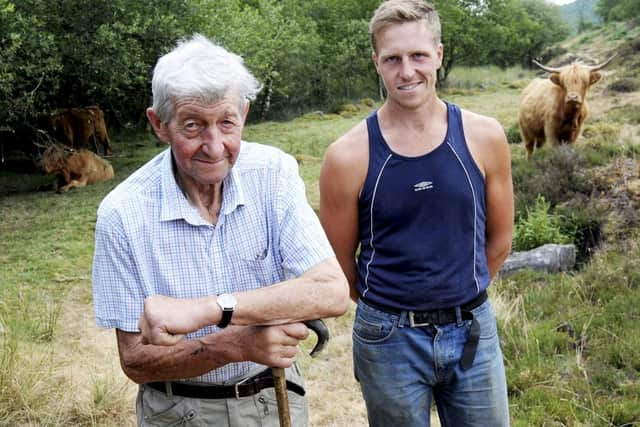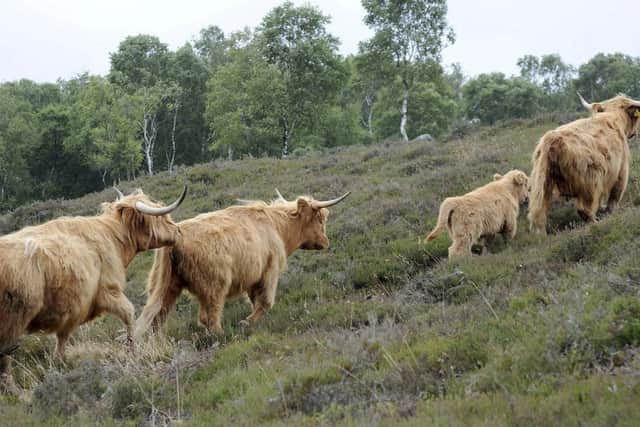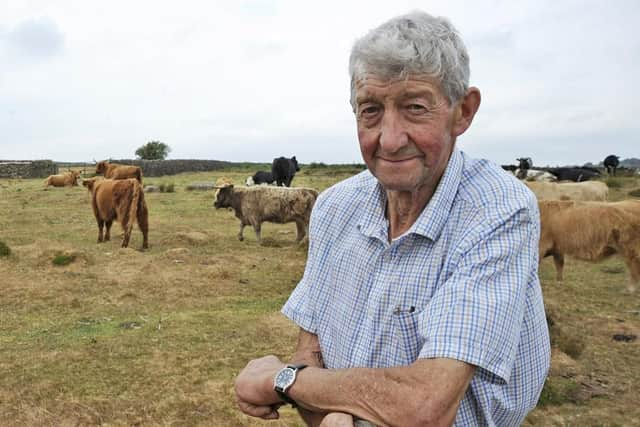Peak District farmers 'forced' to slaughter cattle after dog walker complaint


Stephanie and Alex Birch, of Gorse Bank Farm in Baslow, have had to slaughter half of their herd of 30 Highland cows and calves after a member of the public made a complaint to the Health and Safety Executive (HSE).
After the complaint was made last year by a member of the public who went on to their moorland with his dog and was approached by one of their cows, the HSE said the matter had been resolved 'satisfactorily’.


Advertisement
Hide AdAdvertisement
Hide AdHowever, Mrs Birch said the matter had not been resolved to the farm's satisfaction, after HSE suggested moving or segregating the cattle.
She added that these were not viable options for a number of reasons including significant costs, planning consent challenges and time.
Although the HSE say they have not ordered the slaughter of cattle at this farm, Mr and Mrs Birch felt there was no other choice.
Mrs Birch said: "Four or five of the cows died after we moved them from moorland to grass, as they don't tend to survive as well on grass.


Advertisement
Hide AdAdvertisement
Hide Ad"The complaint was taken overboard, as we have now had to sell half of our cows, and send the other half to slaughter."
She added that she believes there was only one complaint made.
She added that all the HSE had told her and her husband was that ‘the cow approached him (the complainant) and pinned him against a wall’.


The statement from the HSE spokesman said: "HSE has investigated concerns raised in relation to cattle at Baslow.
Advertisement
Hide AdAdvertisement
Hide Ad"We have worked with the owner of the cattle and the matter has been satisfactorily resolved. We will not be commenting further on this.”
Mrs Birch, however, says the case was not handled well by the HSE, saying: "The HSE representative I dealt with did not know what 'right to roam' was, and kept calling the moorland a field.
"The original letter we were sent from the HSE said the incident happened at co-ordinates that did not correlate with the moorlands.
"I asked the HSE to return to the complainant, as there were holes in the story, but they said that was not their process.
Advertisement
Hide AdAdvertisement
Hide Ad"Eventually they did, and I ended up hearing four different stories.”
The herd has been in the family for decades, and were first brought to the moorland by Alex's great-grandfather.
The herd was left to breed naturally for generations, so they were all family.
Mrs Birch said she now wants to make sure this doesn't happen to other farms, and wants to educate the public on the countryside code.
Advertisement
Hide AdAdvertisement
Hide AdShe said: "It is sad and frustrating this has happened - as far as I know, the complainant and their dog were not injured, so this feels like a knee-jerk reaction.
"We want people to enjoy the moorlands, they're beautiful, and also want the public to respect the cows, as it is their home.
"The cows look intimidating with their horns, but they are really docile.
"The cows are protective of their young - if you saw a stranger approach your child, you would be over to your child very quickly, and that's all these cows do."
Advertisement
Hide AdAdvertisement
Hide AdDavid Thorpe wrote an article in Baslow and Bubnell Parish Magazine, which said: “A particularly bad blow this last year concerns our herd of highland cattle and their calves, that have been grazing as their home territory the Eaglestone Moor on Baslow Edge for almost 40 years.
"Despite publicity about not walking with a dog through a herd of cattle, especially when calves are present, some dog walkers continue to do so.
"This has lead to unfortunate incidents. Complaints were made to authorities and we were ordered to move the herd off that area of the moor.
“The last ones go from there at the end of February.”
What does the countryside code say?
The code is a set of guidelines to ensure that the public can enjoy our beautiful countryside, while respecting those who live and work there.
Advertisement
Hide AdAdvertisement
Hide AdThe code states: A farmer will normally close gates to keep farm animals in, but may sometimes leave them open so the animals can reach food and water. Leave gates as you find them or follow instructions on signs. When in a group, make sure the last person knows how to leave the gates.
Leave machinery and farm animals alone – don’t interfere with animals even if you think they’re in distress. Try to alert the farmer instead.
When you take your dog into the outdoors, always ensure it does not disturb wildlife, farm animals, horses or other people by keeping it under effective control.
This means that you: keep your dog on a lead, or keep it in sight at all times, be aware of what it’s doing and be confident it will return to you promptly on command ensure it does not stray off the path or area where you have a right of access.
Advertisement
Hide AdAdvertisement
Hide AdSpecial dog rules may apply in particular situations, so always look out for local signs – for example: Dogs may be banned from certain areas that people use, or there may be restrictions, byelaws or control orders limiting where they can go.
The access rights that normally apply to open country and registered common land (known as ‘open access’ land) require dogs to be kept on a short lead between 1 March and 31 July, to help protect ground nesting birds, and all year round near farm animals It’s always good practice (and a legal requirement on ‘open access’ land) to keep your dog on a lead around farm animals and horses, for your own safety and for the welfare of the animals.
A farmer may shoot a dog which is attacking or chasing farm animals without being liable to compensate the dog’s owner.
